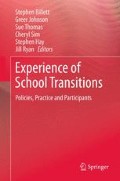Abstract
It is important to neither over-emphasise nor understate the importance of productive post-school transitions. However, for students who are at risk of unsuccessful transitions, there are potential and long-lasting risks. Consequently, there is a need to understand more about post-school transitions and the ways in which policy settings, and school and community practices as well as students themselves can assist the transition process in contemporary and future times. Indeed, the imperatives for productive transitions come from governments. Their concern that education systems prepare and support young people’s post-school transitions leading to productive outcomes in terms of employment or further education and avoiding drifts to unemployment and disengagement from productive economic and societal roles is evident in policy. Parent and communities may well similarly look to the schooling provision to achieve productive outcomes of these kinds for young people, and industry for related but different purposes. In many ways, these transitions are seen as tangible measures of schools’ and the schooling system’s performance. Yet, factors beyond the school itself also shape the kinds of provisions offered to school students and, importantly, how these students engage with such provisions. Hence, to understand transitions and how they might progress productively requires a consideration of the range of contributing factors and also how students take them up: affordances and engagements. This chapter provides an overview of how combinations of affordances and engagements are enacted through the perspectives, approaches and practices articulated through the contributions to this book from the United States of America, the United Kingdom, Germany, Canada, Switzerland and Australia. These contributions range from the articulation of practices, policies and implementation issues across a range of nation states, through to comparisons of how such factors play out in schools across a single educational jurisdiction. In all, they emphasise that post-school transitions are events shaped by more than school policies and practices alone and their worth, enactment and intents are subject to the actions and appraisals of those who participate in them directly or indirectly.
Access this chapter
Tax calculation will be finalised at checkout
Purchases are for personal use only
References
Billett, S. (2001). Learning through work: Workplace affordances and individual engagement. Journal of Workplace Learning, 13(5), 209–214.
Billett, S., Smith, R., & Barker, M. (2005). Understanding work, learning and the remaking of cultural practices. Studies in Continuing Education, 27(3), 219–237.
Billett, S., Thomas, S., Sim, C., Johnson, G., Hay, S., & Ryan, J. (2010). Constructing productive post-school transitions: An analysis of Australian schooling policies. Journal of Education and Work, 23(5), 471–489.
Bourdieu, P. (1977). Cultural reproduction and social reproduction. In J. Karabe (Ed.), Power and ideology in education (pp. 487–511). Oxford, UK: Oxford University Press.
Brooks, R. (2009). Transitions from education to work: An introduction. In R. Brooks (Ed.), Transitions from education to work: New perspectives from Europe and beyond (pp. 1–14). Basingstoke, UK: Palgrave Macmillan.
Cho, M. K., & Apple, M. (1998). Schooling, work and subjectivity. British Journal of Sociology of Education, 19(3), 269–291.
Evans, K. (2002). Taking control of their lives? Agency in young adult transitions in England and the New Germany. Journal of Youth Studies, 5(3), 245–269.
Lehmann, W. (2007). Choosing to labour? School to work transitions and social class. Montreal, QC/Kingston, ON, Canada: McGill-Queen’s University Press.
McMillan, J., & Marks, G. (2003). School leavers in Australia: Profiles and pathways (LSAY report 31). Camberwell, UK: ACER.
Organisation for Economic Co-operation and Development (OECD). (2009). Jobs for all: Initial report. Paris: OECD.
Quicke, J. (1999). A curriculum for life: Schools for a democratic learning society. Buckingham, UK: Open University Press.
Searle, J. R. (1995). The construction of social reality. London: Penguin.
Shanahan, M. J., & Hood, K. E. (2000). Adolescents in changing social structures: Bounded agency in life course perspective. In L. J. Crockett & R. K. Silbereisen (Eds.), Negotiating adolescence in times of social change (pp. 123–136). Cambridge, UK: Cambridge University Press.
Smith, D., & Lovatt, T. J. (1990). Curriculum: Action on reflection. Wentworth Falls, Australia: Social Science Press.
Staff, J., & Mortimer, J. T. (2003). Diverse transitions from school to work. Work and Occupations, 30, 361–369.
Stokes, H., & Wyn, J. (2007). Constructing identities and making careers: Young people’s perspectives on work and learning. International Journal of Lifelong Education, 26(5), 495–511.
Teese, R. (2000). Academic success and social power: Examinations and inequality. Melbourne, Australia: Melbourne University Press.
Walther, A., du Bois-Reymond, M., & Biggart, A. (Eds.). (2006). Participation in transition: Motivation of young adults in Europe for learning and working. Frankfurt, Germany: Peter Lang.
Acknowledgements
The authors wish to acknowledge the support of the Australian Research Council, through its Discovery scheme and also the contributions of the schools, their communities and students, as well as those young people who had left school recently, who informed the discussions here.
Author information
Authors and Affiliations
Corresponding author
Editor information
Editors and Affiliations
Rights and permissions
Copyright information
© 2012 Springer Science+Business Media Dordrecht
About this chapter
Cite this chapter
Billett, S., Johnson, G. (2012). Experiences of School Transitions: Policies, Practice and Participants. In: Billett, S., Johnson, G., Thomas, S., Sim, C., Hay, S., Ryan, J. (eds) Experience of School Transitions. Springer, Dordrecht. https://doi.org/10.1007/978-94-007-4198-0_1
Download citation
DOI: https://doi.org/10.1007/978-94-007-4198-0_1
Published:
Publisher Name: Springer, Dordrecht
Print ISBN: 978-94-007-4197-3
Online ISBN: 978-94-007-4198-0
eBook Packages: Humanities, Social Sciences and LawEducation (R0)

